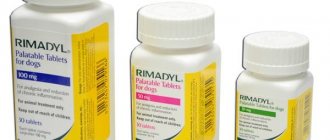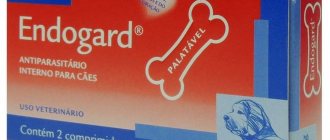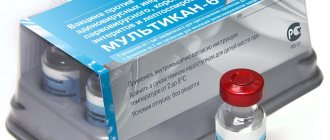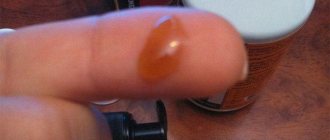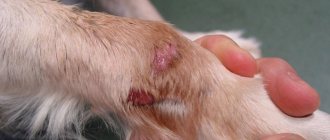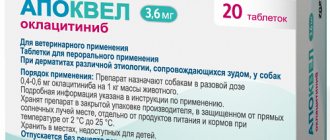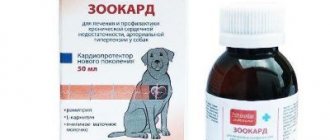In this article I will talk about such a useful drug for dogs as fish oil. I will describe the mechanism of action, instructions for use and list indications for use. I’ll tell you about the benefits and harms of fish oil and how to properly administer the drug to dogs. I will list possible side effects and contraindications.
Can I give it to a dog?
Veterinarians say that dogs should have fish oil in their diet throughout their lives. Indications for its use:
- preventing the development of pathologies of the cardiovascular system;
- rickets;
- ophthalmological diseases;
- atherosclerosis;
- thrombophlebitis;
- thrombosis;
- gastrointestinal pathologies;
- suppressed immune system;
- inflammation of the skin;
- allergic skin diseases.
With the systematic use of this product, bones and muscles are strengthened, lameness is eliminated during the development of arthrosis and arthritis. It is possible to get rid of the symptoms of dermatitis, allergic eczema and other problems with the skin and coat.
Criterias of choice
You can find fish oil for dogs on sale in the form of liquid in a bottle or capsules. There is no difference between them, the only thing is that the drug in bottles is cheaper. Some dogs like capsules, but in general, the choice depends only on your preferences.
Fish oil capsules are much easier to give dogs than liquid fish oil.
Veterinary fish oil for dogs is sold in specialized stores. Its composition is the same as that of the drug from a regular pharmacy. When choosing, you should focus on the following criteria:
- Northern varieties of fish contain more vitamins, so check the composition before purchasing;
- the presence of salmon oil will help better absorption of the drug;
- Make sure that fish oil packages are stored properly. In too warm rooms, the fat will simply die and become unfit for consumption;
- It is desirable that the supplement be extracted from the muscle mass of the fish, and not from their liver, since the latter contains an excess of vitamin A, which in large doses is harmful to the dog’s body;
- fish oil must be highly purified;
- The composition should not contain additional additives such as rosemary or lemongrass.
The right product can significantly improve the health and well-being of your pet in a short time.
Beneficial features
The benefits of the dietary supplement are due to the content of the following substances in fish oil:
- Omega-6 and 3 (polyunsaturated amino acids). Helps normalize metabolic processes.
- Oleic, palmitic acids. Improve metabolism, activate the body's protective functions.
- Phosphorus, bromine, iodine. Have a beneficial effect on the nervous system.
- Vitamins D, A. Positively affect vision, skin, teeth, mucous membranes. Needed for wool. Helps facilitate the transport of calcium into cells.
Fish oil is undoubtedly beneficial for pets . Thanks to its use, the following systems fully function:
- immune;
- nervous;
- auditory;
- visual;
- cardiovascular;
- musculoskeletal.
Benefits and harms
The benefits of consuming fish oil cannot be overlooked. The pet’s well-being and appearance changes after just a few days from the start of the course. It is especially well absorbed in animals and is recommended by almost all veterinarians.
In addition to strong teeth and bones, silky fur and proper skeletal structure, there is more compelling evidence for the benefits of fish oil. The heart, nervous system and brain develop better. And diseases of the musculoskeletal and cardiovascular systems are prevented.
The immunity of animals taking fish oil is also much stronger, and if a pet is susceptible to heart disease, it will be much easier for him. The pet becomes more active and cheerful. Fish oil is an inexpensive and effective remedy for animals.
Any medicine brings not only benefits, but also harm. The drug may not be suitable for some animals and in such cases the idea of using it should be abandoned. Allergy , one of the signals to complete the course, sometimes there may be vomiting or diarrhea. You can purchase the drug in two forms, liquid and capsules, and it happens when such a reaction is not to the fat itself, but to the gelatin capsule in which it is contained. In this case, you should just buy liquid fish oil and try to repeat the course.
An overdose of fish oil is very dangerous . It is imperative that you agree on the dosage and duration of the course, specifically for your dog, with your veterinarian in advance. Before purchasing, you need to carefully study the packaging and composition of the drug; it is not recommended to give your pet fish oil created using an extract from fish liver. This can lead to liver damage, kidney damage, hair loss, etc.
Which fish oil is right for you?
The product is offered in capsules or glass bottles. Release forms have their advantages and disadvantages.
It’s easier to choose the dosage of fat in capsules. It lasts longer and does not have a pungent odor. But sometimes animals are allergic to the gelatin shell. The liquid product costs less and is easy to mix with food.
When choosing, there are several important points to consider:
- high-quality Omega-3 acids are found in mackerel, herring, and salmon;
- Preference should be given to fats from fish muscles rather than liver;
- Salmon oil is easily absorbed;
- It is strictly forbidden to purchase unrefined fat, because it contains substances harmful to the dog;
- You should avoid products with additives (rosemary, lemon), because with their help manufacturers hide violations in manufacturing technology;
- capsules for humans cannot be given to animals; they should be purchased at a veterinary pharmacy.
When purchasing, you need to pay attention to the storage conditions of the drug (in the refrigerator). It is unacceptable for the additive to be exposed to direct sunlight. This product is not suitable for consumption.
You should carefully study the label: it should indicate that the product is intended specifically for dogs.
Where are Omega 3 and Omega 6 fatty acids found, and why are they needed? What is salmon oil?
These are two polyunsaturated fatty essential amino acids. They are not produced in the animal’s body and only come from food. Omega 3 affects the functioning of the heart, the condition of blood vessels and skin. Omega 6 is extremely useful for neuralgia, joint diseases, high blood pressure, and inflammatory processes.
The main source of Omega 3 is sea fish and seafood. We exclude the latter due to allergenic danger. This amino acid is abundant in pollock, hake, sea bass, herring and salmon.
Omega 3 is found in large quantities in vegetable fats:
- corn,
- sunflower,
- linseed oil.
Omega 6 is also present in sea fish, but in extremely small quantities.
For normal growth and functioning, the body must receive these amino acids 10 to 1, that is, 10 parts Omega 3 and 1 part Omega 6. Otherwise, problems with cholesterol may arise, obesity will begin, and heart function will be disrupted.
To simplify the task of balancing Omega 3 and Omega 6, you can resort to industrial preparations - fish oil or salmon oil.
Salmon oil is considered more purified and combined in composition. It is a mixture of highly purified fish oil (fat) obtained from Atlantic salmon with the addition of rosemary extract.
There is an opinion that animals should be given oil, not capsules. But everything is individual.
Features of dosage calculation
The dosage of the beneficial substance largely depends on the age of the pet and its state of health. The amount of fish oil needed per day is different for puppies, adult dogs, and pregnant dogs.
For puppies
Dietary supplement is important for puppies. If you give the drug correctly, you will be able to prevent rickets and avoid developmental delays. In the first month of life, the drug is given if the baby is bottle-fed.
The dosage is selected taking into account the age of the pet:
- Up to 1 month: norm 0.5 tsp. or one capsule. As you get older, the dosage gradually increases.
- Up to 6 months: 2 tsp. or 2 capsules.
- up to 1 year old, the pet should be given 3 tsp. or 3 capsules.
During the first year of life, the product must be used without fail. In the future, you shouldn’t refuse it either.
For adult pets
It is not necessary to feed an adult dog fish oil. This product can be replaced with vitamin complexes. If feeding is carried out with high-quality dry food, then it already contains all the necessary substances.
For an adult dog, it is enough to give 1 capsule or 1 tsp daily. facilities.
Pregnant and lactating animals
During pregnancy up to thirty days, the dog will only need 1 tsp.
or 1 capsule. Then the dosage is increased to 1.5 tsp. or 2 capsules. After childbirth, the dietary supplement is given in the same quantity as in late pregnancy.
Answers from experts
Irina Tyurina: It’s not harmful, it’s vitamin D. But just give it once a day for a week and a children’s dosage. And then you need to take a break. It’s better to give to adult cats in winter, when there is a lack of sun.
In general, pay attention to proper nutrition.
A) Kittens should not be given non-cat food. The same applies to sausages. B) Cats do not digest whole cow's milk. It is better to give sour cream, cream, yogurt (if the kitten will eat it), cottage cheese, fermented baked milk. An excellent product for both kittens and adult animals is goat milk.
C) The yolk of an egg contains vitamin E (biotin), which is extremely necessary for animals. It is better to give the yolk of a quail egg. You should not give kittens protein. It can only be used to stop diarrhea. Please note that the avitin contained in protein blocks the action of biotin, which is necessary for a growing, healthy body.
D) Vegetables and fruits. If the kitten eats them, great! You can give everything, but not salted, not pickled, not spicy: carrots, cabbage, cauliflower, apples, cucumbers, watermelon, etc., any greens. Sprouted grains of oats, barley, and wheat, containing vitamins of groups B and C, are very useful. You can give young nettle shoots after scalding them with boiling water.
D) Mineral supplements are the main source of many groups of vitamins. Cats especially suffer from a lack of vitamins of groups A, B and H. The need for vitamin D is small, so fish oil should not be given often, and vitamin deficiencies in groups C and E are also rare. It is very good to give brewer's yeast. You can buy them in a regular store and add them to the kitten’s drink.
You need to add them in the same way and as much as you would add salt to your soup.
By product, the layout might look something like this:
* 120-150 g of meat and fish * 30-50 g of fermented milk products * 10-20 g of cereals * 20-50 g of vegetables * 1/2 teaspoon of yeast.
Baby daddy: Not harmful. Here is an approximate weekly menu for a cat, which is published in Ian Billinghurst’s book “BARF Diet for Dogs and Cats”: />In addition, in the case of inflammatory diseases (joints, or colds or infectious diseases), the recommended dosage of fish oil for a cat is from 1/2 up to 1 teaspoon per 4.5 kg of cat’s weight, salmon fat - the same - from 1/2 to 1 teaspoon per 4.5 kg of weight.
Ekaterina Vinogradova: it’s possible, but not much!
Alisunya: on the contrary, it’s very useful, because it’s a vitamin...
Natalia: it’s better not to give it in capsules, but in drops. Usually, in the production of capsules, it is not fish oil that is used, but its modifications
By the way, let's be very careful, because an overdose is possible
Alexander Abramov: useful))
Vikulya: It’s possible, and also about pharmacies and pet pharmacies, when a friend’s dog was sick, the veterinarian prescribed expensive tablets, we had friends who once had the same problem, so the veterinarian advised them to buy tablets at a human pharmacy, again human ones, which cost 100 rubles, the dog was cured and the money remained intact, they are bred in veterinarians
Tatyana Maksimovich: yes
FoX: it’s possible, they evaporate from the same fish
Tatyana Lipanina: Of course you can. There is no difference, only the place of purchase is different - a pet store and our human pharmacy.
Prisoner of conscience: Why do you need it? If you feed with ready-made food, everything is already there. There is also no need to eat homemade food, if it is varied. Fish oil is given only for rickets. If you give it in capsule form, how will you calculate the dosage? Compare the weight of the kitten and the person for whom the capsule is intended. Keep in mind that fat-soluble vitamins are not excreted from the body; an overdose can lead to death. If you really want to feed your kitten fish oil, then get it from a pet store and strictly follow the instructions. Once again - do not give it together with ready-made food! You'll poison me!
Olga Gaisenyuk: you can... strengthen your bones))
Frequency of application
Puppies up to one year old are given fish oil daily. In case of digestive disorders, the animal is no longer fed fat for two weeks. After normalization of the condition, it is reintroduced.
Adult dogs are given the dietary supplement in courses lasting three months.
The optimal period is autumn and spring, when the pet is in maximum need of nutrients and is deficient in vitamins.
How to choose the right one
Available in two forms: thick liquid with a strong characteristic odor and capsules.
Available in two forms: thick liquid with a strong characteristic odor and capsules. It is better to choose the second option, since this drug is stored longer. In liquid form it requires special storage conditions, and after opening it quickly goes rancid and becomes unsuitable for consumption.
The food supplement can be purchased at both veterinary and regular pharmacies. It is necessary to pay attention to the expiration date. Also, when choosing fish oil for dogs, you should study the composition - it should not contain any additional components.
Contraindications for use
Fish oil is contraindicated in the following cases:
- the presence of acute intestinal pathologies;
- individual intolerance to the components of the substance;
- open tuberculosis;
- renal failure;
- kidney stones, bladder stones;
- malignant processes;
- kidney and liver diseases;
- indigestion, diarrhea.
The additive is not given to the animal before surgery or when feeding high-quality industrial feed.
If the dog additionally receives vitamin complexes and consumes ready-made food, then the animal runs the risk of overdose. This negatively affects the condition of the kidneys and liver . Possible hair loss and increased fragility of bone tissue.
Harm
All vitamins and supplements are beneficial if taken correctly
. When giving this medication to your pet, you must take into account that some animals may experience an allergic reaction, stomach upset and other negative phenomena.
Important: an allergy can occur not only to the medicine itself, but also to the capsule in which it is located. In this case, it can be given to the pet by first puncturing the capsule and squeezing out the contents from it.
You should not give your pet the drug before scheduled operations or for various intestinal diseases. Remember also about the possibility of overdose.
Before deciding how much to add to your diet, consult your veterinarian. Exceeding the daily dose can lead to such negative consequences as
:
- manifestation of allergic reactions in the form of rashes and redness of the skin;
- low blood clotting;
- excessive gas formation, nausea, vomiting, diarrhea;
- the appearance of a specific odor from the mouth;
- apathy, drowsiness and lethargy.
Caution: If your dog is prescribed a course of anticonvulsant medications, stop taking the drug as it will reduce the therapeutic effectiveness of the medication. There are no prohibitions for certain breeds, so the drug can be given to any dog, be it a German shepherd or a Spitz
There are no prohibitions for certain breeds, so the drug can be given to any dog, be it a German shepherd or a Spitz.
Absolute contraindications for use are:
- renal failure;
- open tuberculosis;
- dysfunction of the thyroid gland;
- malignant formations;
- formation of stones in the bladder and kidneys;
Side effects
The supplement is widely used in the treatment of various diseases and their prevention. Sometimes side effects are observed during its use.
Their appearance is due to the following reasons:
- overdose;
- non-compliance with storage rules;
- allergic reaction;
- use of low quality products.
The following negative changes are noted:
- gagging;
- nausea;
- diarrhea;
- obesity;
- drowsiness;
- apathy;
- lethargy;
- suppression of the immune system.
Possible harm
There are problems with digestion, stool, and vomiting. Such changes indicate the need to abandon fish oil.
Harm to the product is observed if the specified dosages are not observed.
The following problems are possible:
- oversaturation with vitamin A leads to deterioration of the skin and coat, dizziness, loss of appetite, and disturbances in the reproductive system;
- excessive concentration of vitamin D provokes the appearance of problems with blood vessels, intensive urine production, calcium deposition in soft tissues, and the development of osteoporosis;
- regular overdose causes the development of diabetes and hepatitis;
- consuming the product in large quantities leads to gastritis;
- systematically exceeding the permissible dose helps reduce blood clotting, and there is a risk of bleeding;
- Heavy metal poisoning occurs when using a low-quality product.
Possible allergy
It is rare in animals, but there is an allergy, with digestive problems, stool problems, and vomiting.
Such changes indicate the need to stop taking fish oil.
Allergies are often caused by the capsule shell; in this case, the pet should only be given its contents. The capsule is punctured and the liquid is squeezed into the animal's mouth.
Use for hair loss
Use of fish oil for hair loss is allowed only as prescribed by a veterinarian. Self-medication is unacceptable .
If the dosage is incorrectly selected, the effect will be the opposite: instead of the desired improvement in the condition of the coat, more intense baldness begins.
It is necessary to identify the cause of negative changes. The product is used if hair loss occurs due to a deficiency of its constituent substances.
Tags
Fish oil forFish oil forFish oil in fish oil the followingFish oil indisputably the dosage of fat follows the fats from dogs to give to the dog to give to the dog the diet of dogs should for dogs.pregnant dogs is different.An adult dog is enough a day for a dog is enough for older dogs to have a dog Fish oil Fish oilWhat kind of fish oilwhat is fish oilin fish oil Omega fish oil dosage for omega 3 role of Omega 3 Omega dosages for omega acids. Description Omega 3 and Omega 6 contain Omega 3
weeksfoodarticlesdiseaseanswercommentcatsyouroil

